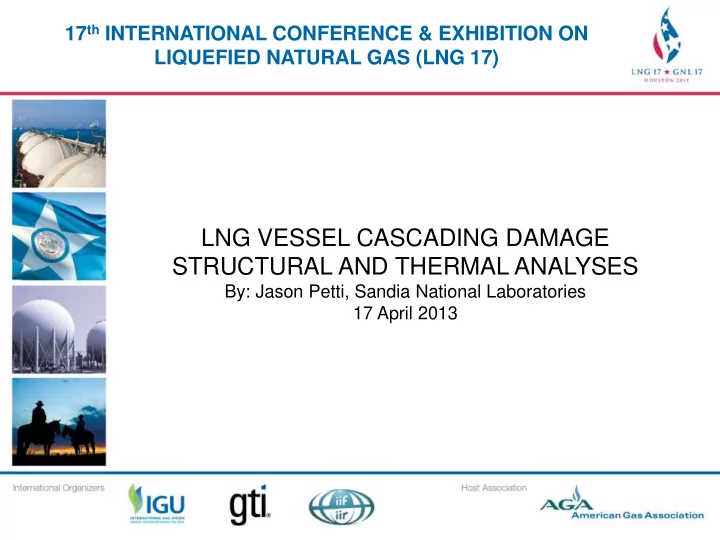

17 th INTERNATIONAL CONFERENCE & EXHIBITION ON 17 th INTERNATIONAL CONFERENCE & EXHIBITION LIQUEFIED NATURAL GAS (LNG 17) ON LIQUEFIED NATURAL GAS (LNG 17) LNG VESSEL CASCADING DAMAGE <Title of Presentation> STRUCTURAL AND THERMAL ANALYSES <Title of Presentation> By: <Author Name>, <Organization> By: <Author Name>, <Organization> By: Jason Petti, Sandia National Laboratories <Date> <Date> 17 April 2013
LNG Cascading Damage Scenario Can an LNG tank breach event cascade throughout the tank, extend to other tanks, and experience further damage due to an external fire? Membrane LNG Carrier
Multi-Physics Cascading Damage Analysis Approach Fire Tests & Analysis Cryo Damage Heat Transfer Testing/Model Tests Development Fire Load F(x,t) Exterior LNG Pool Temperatures Structural Damage LNG Flow F(x,t) F(t) Model Analysis Cryo Interior Flow, F(x,t) Tank Draining F(t) Stress, Damage, & Stability Analysis
LNG Cascading Damage Components Vessel Model Development Basic Material Tests Large Scale Fracture Tests LNG Flow Analysis Damage Model Development & Calibration Internal Flow External Flow Fire & Insulation Tests LNG Heat Transfer Tests Vessel Fire Analyses Cooling Rates (Air and Water) Heating Rates Structural Damage Analysis – Assess Cryo Damage State Assess Effects from Fire
LNG Ship Structural Steel Thermal Damage Issues and Concerns LNG spills known to cause brittle fracture of ship deck plates – Fracture testing showed LNG ship steels vulnerable to fracture at LNG temperatures Fires reduce steel strength – Testing showed LNG ship steel strength will be reduced to ~15% at LNG fire temperatures
Cryogenic Damage Testing TESTING GOAL: Perform tests to explore thermally induced crack propagation. Results provide input for Damage Model. Phase I – Exploratory small plate tests, subjected to LN 2 and designed to explore testing procedures Phase II – Small scale tests to examine crack propagation, cooling region changes, marine steels Phase III - Large scale tests with representative vessel hull features Also performed basic material tests (stress-strain, Charpy, CTE) for ABS Grade A and ABS Grade EH36 over -191C to 800C.
Cryogenic Damage Test Setup
Cryogenic Damage Testing Cracked Plate Example
Cryogenic Damage Testing - Phase III Structure
Cryogenic Damage Testing - Phase III Example
Cryogenic Damage Testing - Phase III Example
Cryogenic Damage Testing - Phase III Example
Summary of Cryogenic Testing Results Fractures occurred mainly in the LN2 flow area – Fractures did propagate slightly outside the LN2 flow area due to cooling Fracture initiation was observed at machined notches and structural discontinuities – Many initiation sites exist within vessels Mechanical pre-load (initial stress) not required to initiate/propagate fracture – Localized cryo temperatures are enough to generate fractures given stress concentrations Fractures propagate through all cold structural members - webs, stiffeners, flanges Fractures can occur in structural elements in contact with water – Depends on the current strength and other factors
Damage Model • Fracture model produces similar qualitative fracture and damage directions and results • Damage occurs across plates and members and secondary cracks occur • Damage progresses up and through the side wall
Full Vessel Model Development Used detailed drawings and information on Membrane and Moss vessels Structural components have been explicitly represented with some simplifications in aft and forward regions Weight distribution for non-structural items and LNG cargo are represented with appropriate loading functions ~4.5 million elements used for Moss and Membrane vessels
Moss Regions Fore (less detail) Mid ship (detailed section Aft (less detail)
Membrane
Meshing
Moss and Membrane Flow Analyses
External Flow Analyses
External Pool Sizes External LNG Pool Formation MOSS Membrane Above WL ~ 180m ~ 350m Near WL ~ 205m ~ 330m
Cooling Rate Studies 38 18 -2 -22 Temperature (°C) -42 Temp-mid (400) Temp-edge (400) -62 Temp-out (400) Temp-mid (1080) -82 Temp-edge (1080) -102 Temp-out (1080) -122 -142 -162 0 300 600 900 1200 1500 1800 2100 2400 2700 3000 3300 3600 time (s)
LNG Cascading Damage Initial Conditions & Assumptions Two vessels examined: Membrane and Moss Several breach scenarios evaluated for each class of ship – based on a range of small to large breach events, these define the initial conditions for this study Conditions analyzed are near shore, calm water The initial load state was computed for each vessel (Summer Arrival – full load – no ballast) Regions of LNG flow identified for both vessels Above waterlines analyzed, but not significantly different that near waterline The temperature of the LNG flow regions was decreased based on LNG heat transfer tests Damage model removes elements after reaching strain/temperature criterion
Moss - Damage
Moss - Damage
Moss Section Analysis Original Section Cryo Fire
Membrane – Damage
Membrane Damage
Fire and Heating Regions MOSS: 180m Heating Regions Mem.: 210m
Membrane Section Analysis Original Section Cryo Fire
LNG Cascading Damage Summary Large scale fracture testing program conducted to calibrate computational damage model Assessments performed for a number of assumed breach scenarios for each class of ship: Membrane and Moss Each scenario included an assessment of the final damage states, small holes may be manageable, medium and large holes lead to significant damage within the vessel
Recommend
More recommend